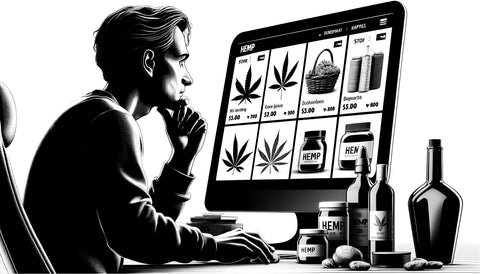Part of what makes Amazon’s model so successful is the variety of products it offers. Need specialty dog food, hand sanitizer, and a new board game? Amazon lets you order all these at the same time from the same place. But what about CBD? Can you get the curative cannabinoid from Amazon, and is it even safe? The answer is more complicated than you think.
Amazon's policy technically prohibits the sale of CBD products, yet an alarming number of hemp-based items are available on the platform, often masquerading as CBD products without explicitly stating so. This subtle circumvention of rules has paved the way for a troubling trend of mislabeled and misleading product listings. Independent analyses, such as those conducted by CBD Oracle, reveal a disturbing landscape where false dosage labels are the norm rather than the exception, and products frequently contain no CBD or hemp at all.
Amazon's Misleading CBD Market

Navigating the online marketplace for CBD products can be akin to walking through a minefield, especially on Amazon, where the policies and practices surrounding these products create a fog of confusion and misrepresentation. Despite Amazon's explicit policy that prohibits the sale of CBD products, the platform is awash with listings that cleverly skirt around these regulations, using ambiguous terminology and misleading descriptions.
The Policy and Its Loopholes
Amazon's current stance is clear on paper but murky in practice. The platform officially bans the sale of CBD products, aligning itself with a cautious approach to the largely unregulated CBD market. However, sellers have found a loophole by avoiding the term "CBD" altogether, opting instead to label their products as "hemp". This subtle linguistic shift allows them to evade direct scrutiny while implying to consumers the presence of CBD benefits.
Jan Brandup, CEO of Neurogan, sheds light on this deceptive practice, noting that Amazon's "hemp products" often have little to do with actual hemp, let alone CBD. This misuse of terminology is not merely a matter of semantics; it's a calculated strategy to capitalize on consumer trust and the platform's credibility.
The Reality Behind 'Hemp' Products on Amazon
The allure of Amazon's convenience and vast selection becomes a double-edged sword when it comes to CBD and hemp products. Mike Sill, CEO of Sunday Scaries, points out a significant consequence of Amazon's regulations— the exclusion of reputable CBD brands from the platform. This exclusion leaves a void that is quickly filled by lesser-known entities eager to exploit the marketplace's reach, often at the expense of product integrity and consumer trust.
These entities engage in what's been termed "brand burning," a process where once caught and banned from Amazon, companies simply rebrand and relist their products, perpetuating a cycle of questionable business practices. This approach underscores a fundamental issue: the prioritization of sales over the establishment of a trustworthy brand presence and commitment to quality.
Navigating the Murky Waters
The result of Amazon's policy and its circumvention by sellers is a marketplace flooded with products that are at best ineffective and at worst potentially harmful. Consumers seeking the therapeutic benefits of CBD may find themselves navigating a landscape filled with products lacking in credibility and, crucially, quality.
The Issue with Amazon “CBD”

While Amazon's marketplace offers a plethora of options for eager consumers, recent independent analyses have peeled back the veneer of convenience to reveal a more troubling picture. Mislabeling and inconsistencies in product quality not only betray consumer trust, but also spotlight the urgent need for regulatory oversight and consumer education.
False Dosage Labels and Inconsistencies
A startling revelation from an analysis conducted by CBD Oracle is that a staggering 96% of tested Amazon hemp products boasted inaccurate dosage labels, leaving consumers in the dark about what they're actually purchasing. This discrepancy is not a minor oversight; it reflects a systemic issue where the actual content of CBD, if present at all, significantly diverges from what is advertised. In some instances, products contained as little as 25% of the advertised dosage, while others misleadingly doubled the amount of delta-8 THC, a psychoactive compound, raising concerns about consumer safety and product integrity.
Presence of Unregulated Substances
Compounding the issue of dosage inaccuracies, the analysis found that a small but concerning percentage of products contained THC, including delta-8 THC variants. While these were under the legal THC threshold set by the 2018 Farm Bill, the presence of high quantities of THC in products marketed as CBD or hemp underscores the risks consumers face in an inadequately regulated market. Such findings not only contravene Amazon's own policies but also flirt with legal non-compliance, putting unsuspecting consumers at risk of unwittingly ingesting psychoactive substances.
Lack of Transparency and Quality Assurance
Perhaps most damning is the near-total absence of Certificates of Analysis (COAs) among the products analyzed. COAs are pivotal in establishing a product's composition, safety, and compliance with legal standards. Their absence on Amazon's platform is a glaring omission that reputable CBD brands typically do not make. Moreover, nearly half of the products analyzed made unfounded medical claims, misleading consumers about the purported benefits of these hemp-derived products.
This lack of transparency and quality assurance not only endangers consumer health but also undermines the credibility of the broader CBD and hemp industry. The trust consumers place in the products they purchase, especially for wellness and therapeutic purposes, is fundamental. When that trust is eroded by widespread mislabeling and the peddling of potentially harmful products, it casts a long shadow over the entire industry.
The Risks to Consumers

The implications of purchasing CBD and hemp products from Amazon extend beyond mere disappointment or wasted expenditure. The stakes involve potential health risks, legal complications, and a broader impact on the perception and progress of the cannabis industry. Understanding these risks is crucial for consumers navigating the online marketplace in search of natural wellness solutions.
Health Risks and Legal Concerns
Consumers turning to CBD for its therapeutic benefits—such as relief from anxiety, pain, or insomnia—might unknowingly ingest products that contain no CBD at all or, worse, harmful substances. The presence of unregulated psychoactive compounds like delta-8 THC in products labeled as hemp or CBD introduces a level of risk that consumers are often not consenting to. Besides the potential for unintended psychoactive effects, these products may interact with medications, exacerbate health conditions, or lead to positive drug tests, raising legal and employment issues for unsuspecting individuals.
Undermining Industry Integrity
Beyond individual risks, the sale of mislabeled and misleading products on Amazon poses a significant threat to the credibility of the CBD and hemp industry. At a time when the industry strives for acceptance and recognition of its potential health benefits, these practices cast a shadow of doubt and skepticism.
The efforts of reputable brands and advocates working to ensure product safety, efficacy, and regulatory compliance are undermined by the proliferation of inferior and potentially deceptive products. This not only hampers consumer trust but also impedes the progress towards comprehensive regulatory reform that would benefit consumers and the industry alike.
Eroding Consumer Trust
The cornerstone of the burgeoning CBD market is consumer trust, which is eroded when products fail to deliver on their promises. The lack of transparency and accountability on platforms like Amazon leaves consumers vulnerable to exploitation. When a consumer's initial foray into CBD results in a negative experience—be it due to ineffective products, misleading claims, or adverse effects—it not only deters them from exploring further but also spreads skepticism and apprehension towards CBD products as a whole. This not only affects individual brands but also slows the overall growth and acceptance of CBD as a legitimate and beneficial wellness product.
Navigating Safely in the CBD Marketplace
The findings from independent analyses underscore the importance of diligence and education in purchasing CBD and hemp products. Consumers are encouraged to seek out reputable brands that offer transparency, lab reports, and clear product information. This vigilance not only safeguards one's health and legal standing but also supports the broader movement towards a safe, regulated, and thriving CBD industry.
A Call for Stricter Regulations and Consumer Awareness

First and foremost, platforms like Amazon must take responsibility for the enforcement of their own policies. While Amazon’s stance prohibits the sale of CBD, the lack of rigorous enforcement has led to a marketplace rife with misleading and potentially unsafe products. Implementing stricter vetting processes for sellers and products, along with swift action against those who circumvent the rules, is essential. Platforms could employ more advanced technology and human oversight to ensure compliance, thereby protecting consumers and preserving market integrity.
Mandatory Lab Reports and Certificates of Analysis (COAs)
Requiring all hemp and CBD products to include up-to-date lab reports and Certificates of Analysis (COAs) could significantly enhance product transparency. COAs provide crucial information on cannabinoid content and the presence of contaminants, offering consumers a reliable basis for comparison and choice. Platforms should make the provision of COAs a non-negotiable condition for sellers, thereby elevating the standard of products offered and assisting consumers in making informed decisions.
Consumer Education and Advocacy
Consumers play a vital role in shaping the market. Educated consumers who demand transparency, quality, and safety can drive change by supporting brands that uphold these values. Advocacy for clearer labeling, access to COAs, and the demystification of hemp versus CBD content can help steer the market towards more ethical practices. Additionally, consumers should be wary of unsubstantiated medical claims and learn to identify red flags that may indicate a product's lack of credibility.
Supporting Reputable Brands
Choosing to purchase directly from reputable brands or authorized retailers is another effective way for consumers to ensure they receive high-quality, safe CBD products. Many trustworthy brands offer extensive product information, transparent sourcing, and lab results directly on their websites. By prioritizing these brands, consumers not only safeguard their own health and well-being but also contribute to a market ecosystem that values integrity and consumer trust.
Advocating for Regulatory Reform
Finally, there is a pressing need for comprehensive regulatory reform that addresses the gaps and ambiguities currently plaguing the CBD market. Consumers, alongside industry leaders and advocacy groups, should call for clear, uniform standards governing the production, testing, and labeling of CBD products. Engaging with policymakers and supporting legislation that promotes safety and transparency can help ensure that the CBD market evolves in a manner that benefits all stakeholders.
Navigating the complex world of CBD and hemp products requires vigilance, education, and a proactive approach from consumers. By demanding higher standards, supporting reputable brands, and advocating for regulatory reform, consumers can help foster a safer, more transparent market. As the industry continues to grow, collective efforts to address these challenges will be instrumental in realizing the full potential of CBD as a safe and beneficial component of health and wellness routines.
Commitment to Transparency and Quality

At E1011 Labs, we understand that navigating the CBD marketplace can be challenging for consumers, especially when faced with the myriad of options and claims present online. That's why we place a premium on transparency and accountability, setting us apart in an industry where these qualities are crucial yet not universal.
Certificates of Analysis (COAs): Our Promise of Purity and Potency
One of the cornerstones of our commitment to transparency is providing Certificates of Analysis (COAs) for all our flower products. By ensuring that our products are rigorously tested by third-party laboratories, we offer our consumers peace of mind, knowing that what they are purchasing meets the highest standards of quality and safety.
Upholding High Standards
At E1011 Labs, our ethos revolves around the integrity of our products and the well-being of our customers. Our full-spectrum hemp products are crafted with the utmost care, ensuring that the natural profile of the hemp plant is preserved. This commitment to quality extends from seed to shelf, beginning with the careful selection of hemp strains known for their robust cannabinoid profiles and cultivated using sustainable and responsible farming practices.
Setting a Standard for the Industry
In an industry where vague claims and ambiguous labeling are all too common, E1011 Labs stands out by providing clear, accessible information about our products. We are proud to lead by example, demonstrating that it is possible to deliver exceptional full-spectrum hemp products without compromising on transparency or customer trust. For us, it's not just about being a part of the industry; it's about setting the standard for excellence within it.
Conclusion: Navigating the CBD Landscape with Confidence
In the rapidly expanding world of CBD and hemp products, consumers face the challenge of navigating a marketplace saturated with options that vary widely in quality and transparency. The revelations about mislabeling and the absence of critical product information on platforms like Amazon underscore the importance of diligence and informed decision-making. As we've explored, the risks associated with these marketplace shortcomings are not trivial, impacting not only individual health and safety but also the broader perception and integrity of the CBD industry.
The call for stricter regulations and enhanced consumer awareness is clear. It's imperative that both consumers and companies advocate for a marketplace that values transparency and quality. Consumers can protect themselves and support the industry's positive growth by seeking out reputable brands like E1011 Labs, which prioritize not only the efficacy of their products but also the well-being of their customers.



